 W
WLuisa Isabel Alvarez de Toledo y Maura, 21st Duchess of Medina Sidonia, GE was the holder of the Dukedom of Medina Sidonia in Spain. She was nicknamed La Duquesa Roja or The Red Duchess due to her lifelong left-wing, anti-Francoist, pro-democracy political activism.
 W
WThe Barcelona tram strike was a strike in Barcelona, Spain, that took place on March 1, 1951. During the strike, citizens boycotted the Barcelona tram service, protesting a plan by local authorities to increase tram fares by up to 40%. Although the strike did not achieve all of its goals, it was successful in having the fare increase withdrawn. It was considered "the last battle of the generation that lost the war."
 W
WThe Canary Islands Independence Movement (CIIM), also known as the Movement for the Independence and Self-determination of the Canaries Archipelago, was an independentist organization that had a radio station in Algiers and resorted to violence in attempts to force the Spanish government to create an independent state in the Canary Islands.
 W
WThe Carlist Party is a Spanish political party that considers itself as a successor to the historical tradition of Carlism. The party was founded in 1970, although it remained illegal until 1977 following the death of the caudillo Francisco Franco and the democratisation of Spain.
Communist Action was a Marxist organisation in Spain founded in exile in 1964, during the Francoist State. The organisation produced a newspaper entitled Acción Comunista. Among its members were Carlos Semprún and José Antonio Ubierna. In 1970 AC came in contact with workerist organizations like UHP and CRAS. In 1976 some of its members, especially in Catalonia, joined the POUM.
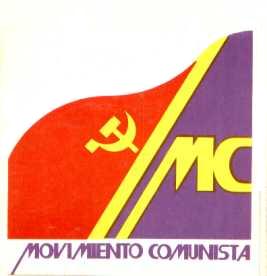 W
WCommunist Movement was a political party in Spain. It was founded in 1972 as Movimiento Comunista de España (MCE).
 W
WThe Communist Party of Spain (Marxist-Leninist) is a communist political party in Spain, formed in 1964 through the merger of splinter groups of the Communist Party of Spain (PCE).
 W
WThe Confederación Nacional del Trabajo is a Spanish confederation of anarcho-syndicalist labour unions, which was long affiliated with the International Workers' Association (AIT). When working with the latter group it was also known as CNT-AIT. Historically, the CNT has also been affiliated with the Federación Anarquista Ibérica ; thus, it has also been referred to as the CNT-FAI. Throughout its history, it has played a major role in the Spanish labor movement.
 W
WThe Democratic Junta of Spain was a Spanish organization that coordinated various pro-democracy parties, unions and associations during the late Francoist State.
 W
WDemocratic Union of the Valencian Country was a political party in the Valencian Country, Spain. It was founded clandestinely in the University of Valencia in 1962. The party was illegal until 1977.
 W
WThe Dream and Lie of Franco is a series of two sheets of prints, comprising 18 individual images, and an accompanying prose poem, by Pablo Picasso produced in 1937. The sheets each contain nine images arranged in a 3x3 grid. The first 14, in etching and aquatint, are dated 8 January 1937. The remaining four images were added to the second printing plate later, without use of aquatint, and dated June 7, 1937.
 W
WETA political-military or ETA (pm) was the majority faction of the Basque revolutionary armed organization ETA, who during Spain's transition to democracy opted for a double legged structure, political on the one side and military on the other, while ETA militarra or ETA(m) adopted a military-only structure with its constituent divisions detaching into new self-standing organizations.
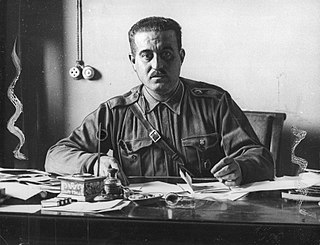 W
WManuel Fal Conde, 1st Duke of Quintillo (1894–1975) was a Spanish Catholic activist and a Carlist politician. He is recognized as a leading figure in the history of Carlism, serving as its political leader for over 20 years (1934–1955) and heading the movement during one of its most turbulent periods. Initially he led the belligerent faction pressing anti-Republican insurgency; during the Spanish Civil War he joined the Nationalists; later on he championed the anti-Francoist strategy.
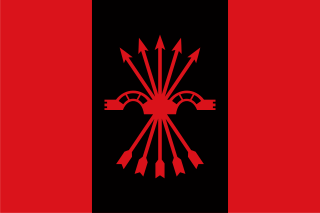 W
WFalange Española Auténtica (FEA) was a neo-fascist and anti-Francoist political party in Spain.
 W
WThe First of October Anti-Fascist Resistance Groups was a Spanish clandestine Marxist–Leninist group aiming for the formation of a Spanish Republican state.
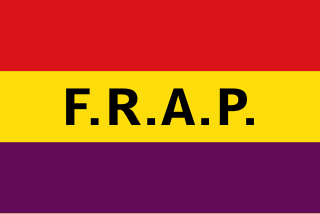 W
WThe Revolutionary Antifascist Patriotic Front (FRAP) was a radical Spanish Anti-Francoist, Marxist–Leninist revolutionary organization that operated in the 1970s. This group was initially inspired by the success of the student demonstrations of May 1968 in France.
Galician Revolutionary Students was a leftwing nationalist students organization in Galicia, Spain. ERGA functioned as the students wing of the Galician People's Union (UPG). ERGA was founded in 1972. ERGA published a monthly, Lume. ERGA was the first mass organization of nationalism after the civil war, got a broad presence in the universities and high schools of Galiza and formed future UPG leaders and militants.
 W
WHerriko Alderdi Sozialista was a revolutionary socialist Basque political party, with presence only in the French Basque Country.
 W
WLaw 52/2007 That recognises and broadens the rights and establishes measures in favour of those who suffered persecution or violence during the Civil War and the Dictatorship, commonly known as Historical Memory Law, is a Spanish law passed by the Congress of Deputies on 31 October 2007. It was based on a bill proposed by the Spanish Socialist Workers' Party government of Prime Minister José Luis Rodríguez Zapatero. The Historical Memory Law principally recognizes the victims on both sides of the Spanish Civil War, gives rights to the victims and the descendants of victims of the Civil War and the subsequent dictatorship of General Francisco Franco, and formally condemns repressions of the Franco Regime.
 W
WJosep Montserrat i Torrents , better known as José Montserrat Torrents in the Spanish-speaking world, is a Spanish writer, philosopher, historian and Coptic scholar.
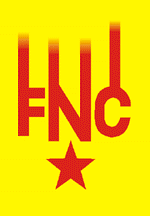 W
WThe National Front of Catalonia was a Catalan separatist party which was active between 1940 and 1990. The FNC was created in 1940 by former members of the Estat Català and the Catalan Nationalist Party, with the latter dissolving and splitting its membership between the Estat Català and the FNC. The main goals of the FNC were to present an opposing front to the Spanish State of caudillo Franco and to advocate for Catalan independence. In 1946, the FNC became an officially independent party by breaking its relationship with the Estat Català.
 W
WOrganisation of Marxist–Leninists of Spain, in Spanish: Organización de Marxistas-Leninistas de España, (OMLE) was a Spanish communist group. OMLE was formed in Brussels in September 1968 by various nuclei that had left the Communist Party of Spain (PCE). OMLE denounced PCE as revisionist.
 W
WCommunist Party of Spain (international), was a communist political party in Spain.
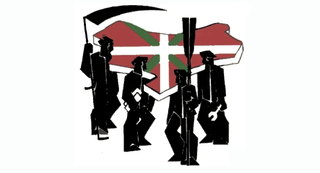 W
WLangile Abertzale Iraultzaileen Alderdia, was a Communist political party of the Southern Basque Country and Basque nationalist ideology that was born during the last years of the Francoist State as a result of a division of ETA. Its acronym, laia is also the Basque name of an agricultural tool.
 W
WThe People's Socialist Party was a Spanish political party.
 W
WRevolutionary Communist League was a political party in Spain. It was founded in 1971 by members of the Catalan group Comunisme, a split of the Popular Liberation Front (FLP). The LCR had a trotskyist ideology, adopting more heterodox political positions in the 1980s.
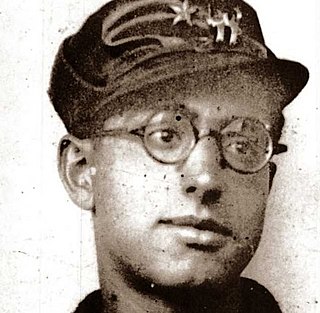 W
WRamón Rufat Llop (1916–1993) was a Spanish anarcho-syndicalist, agent of the Republican secret services, and anti-Franco fighter.
 W
WSindicato Labrego Galego-Comisións Labregas is a Galician farmers and breeders union centered on family farms and small peasants.
 W
WThe Spanish Maquis were Spanish guerrillas exiled in France after the Spanish Civil War who continued to fight against Francoist Spain until the early 1960s, carrying out sabotage, robberies, occupations of the Spanish embassy in France and assassinations of Francoists, as well as contributing to the fight against Nazi Germany and the Vichy regime in France during World War II.
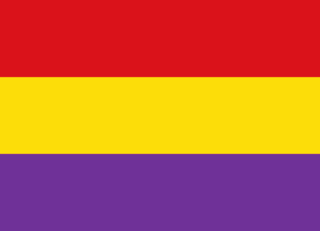 W
WSpanish National Liberation Front, better known by its acronym FELN, was a Spanish Republican antifascist opposition group based in Belgium and France active between 1963 and 1970. Its founder was Julio Álvarez del Vayo.
 W
WThe Government of the Spanish Republic in exile was a continuation in exile of the government of the Second Spanish Republic following the victory of Francisco Franco's forces in the Spanish Civil War. It existed until the restoration of parliamentary democracy in 1977.
 W
WThe Workers' Commissions since the 1970s has become the largest trade union in Spain. It has more than one million members, and is the most successful union in labor elections, competing with the Unión General de Trabajadores (UGT), and with the anarcho-syndicalist Confederación General del Trabajo (CGT), which is usually a distant third.
 W
WThe Workers' Revolutionary Organisation was a Maoist communist organisation in Spain. The newspaper of the organization was En Lucha.